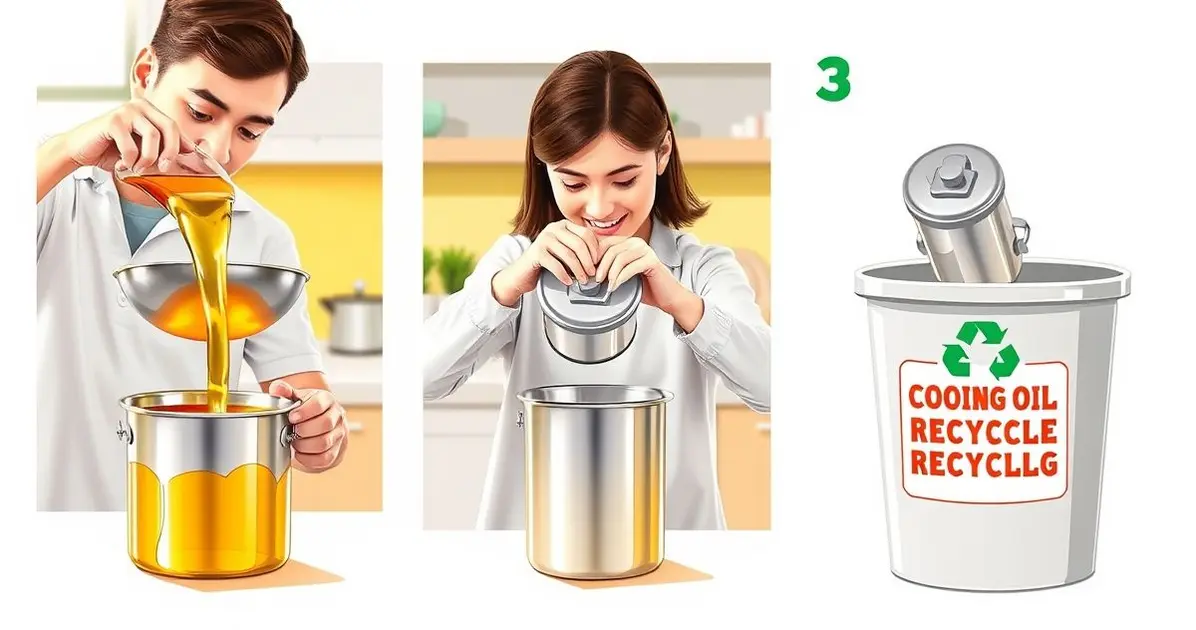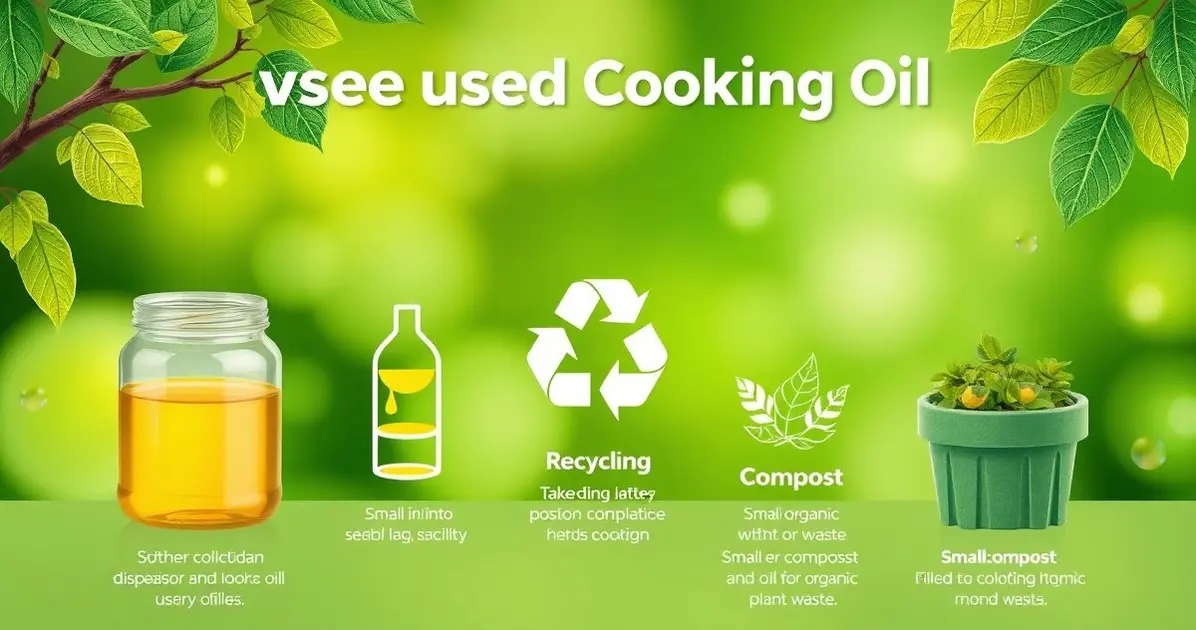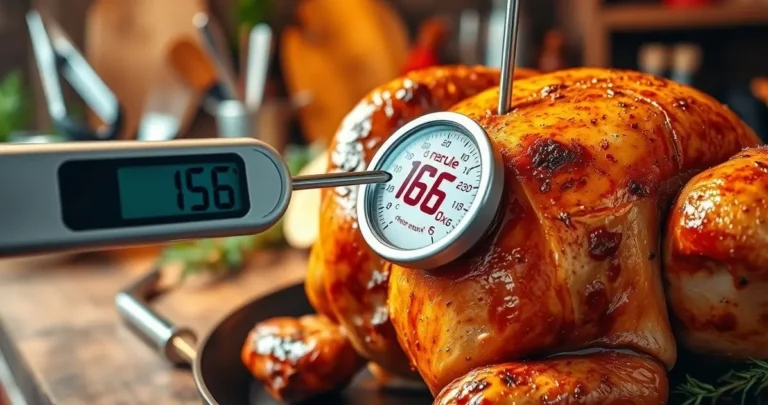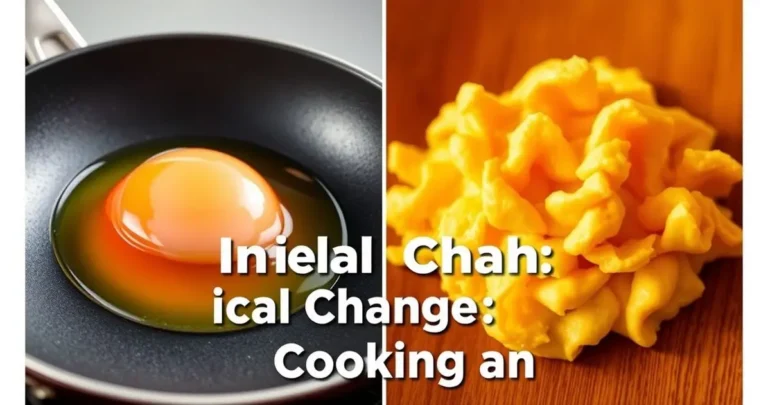Proper disposal of cooking oil is essential to protect the environment. Used cooking oil can cause plumbing issues and harm wildlife if thrown away improperly. Here are some effective methods to dispose of it responsibly.
How to dispose of cooking oil

When disposing of cooking oil, consider methods like recycling, composting, or taking it to a local waste center. Never pour it down the drain or toilet, as it can lead to blockages and environmental harm. Using eco-friendly practices helps keep our waterways clean.
Why Proper Disposal Matters
Understanding why proper disposal of cooking oil is crucial is the first step towards responsible cooking practices. Here are some key reasons:
Environmental Protection: When cooking oil is improperly disposed of, especially by pouring it down the drain, it can lead to significant environmental damage. Oil can contaminate water sources, harming aquatic life and disrupting ecosystems.
Preventing Plumbing Issues: Pouring oil down the sink can cause serious plumbing problems. Oil can solidify and build up in pipes, leading to clogs that require expensive repairs. By disposing of oil correctly, you can avoid these costly plumbing issues.
Promoting Sustainable Practices: Proper disposal encourages recycling and repurposing, which are essential for sustainability. By finding ways to reuse or recycle cooking oil, you contribute to a circular economy that minimizes waste and promotes resource conservation.
Community Health: Improper disposal can lead to pollution in local communities. Contaminated water and soil can affect public health, leading to issues like contaminated drinking water and food sources. Proper disposal helps keep communities safe and healthy.
Responsibility as a Consumer: As consumers, we have a responsibility to protect our environment. By understanding and implementing proper disposal methods, we contribute to a culture of environmental awareness and responsibility.
In summary, proper disposal of cooking oil is not just a good habit; it’s a vital practice that impacts our environment, health, and community. Taking the time to dispose of cooking oil responsibly can make a significant difference.
Creative Ways to Reuse Cooking Oil
Instead of tossing out used cooking oil, consider these creative ways to give it a second life. Reusing cooking oil can not only save you money but also reduce waste. Here are some innovative ideas:
Homemade Soap: Used cooking oil can be transformed into beautiful homemade soap. By combining it with lye and other natural ingredients, you can create a variety of soaps that are gentle on the skin and environmentally friendly.
Natural Candles: You can make eco-friendly candles using used cooking oil. Just mix the oil with wax and your favorite scents, pour it into a mold, and insert a wick. These candles will burn cleanly and add a lovely aroma to your home.
Bird Feeders: Mix used cooking oil with birdseed to create homemade bird feeders. The oil helps bind the seeds together, and birds will love the extra energy from the fat. Just mold the mixture into shapes and hang them outside!
Leather Conditioner: Used cooking oil can also serve as a natural leather conditioner. A small amount can help soften and protect leather items like shoes, bags, and furniture. Just apply a little oil with a soft cloth to keep leather looking its best.
Fertilizer for Plants: If you have vegetable oil that is plant-based, you can use it as a fertilizer for your garden. Mix a small amount with compost to enrich the soil and promote healthy plant growth.
These creative ideas not only help you reuse cooking oil but also promote sustainability. So, before you decide to dispose of that used oil, think about how you can repurpose it into something useful!

Biodegradable Disposal Methods
When it comes to disposing of cooking oil, opting for biodegradable methods is an eco-friendly choice. Here are some effective biodegradable disposal methods to consider:
Composting Small Amounts: If you have a small quantity of vegetable oil, it can be composted. Mixing the oil with dry materials like leaves, straw, or shredded paper helps balance the compost pile. This method allows the oil to break down naturally and enrich the compost.
Soil Amendments: Small amounts of used cooking oil can be added to soil as an amendment. It can improve soil structure and provide nutrients. However, it’s essential to use only minimal amounts to prevent attracting pests or creating an imbalance.
Biodegradable Containers: If you’re disposing of cooking oil, consider using biodegradable containers to store it before disposal. This way, the container itself will break down naturally, reducing waste in landfills.
Local Community Programs: Some communities offer biodegradable disposal options for cooking oil. Check with local waste management or environmental organizations for programs that accept used oil for composting or recycling.
Natural Absorbents: If you have small spills or leftover oil, using natural absorbents like sawdust or kitty litter can help. Once the absorbent material has soaked up the oil, it can be composted if it’s safe, or disposed of in a biodegradable manner.
Choosing biodegradable disposal methods not only helps reduce waste but also supports a healthier environment. By being mindful of how you dispose of cooking oil, you can make a positive impact on the planet.
Local Recycling Programs for Cooking Oil
Finding local recycling programs for cooking oil is a great way to ensure that your used oil is disposed of responsibly. Here are some tips and information on how to locate and utilize these programs:
Check with Local Waste Management Facilities: Your local waste management facility is a good starting point. They often have information about recycling programs that accept used cooking oil, including drop-off locations and guidelines for disposal.
Community Recycling Events: Many communities hold special recycling events where residents can drop off cooking oil along with other recyclable materials. Keep an eye on community bulletin boards or websites for announcements regarding these events.
Environmental Organizations: Local environmental organizations often run or collaborate with recycling programs. They can provide information on where to recycle cooking oil and may even offer resources for proper disposal methods.
Online Directories: Websites like Earth911 or local government websites may have searchable databases that help you find nearby recycling centers that accept cooking oil. Simply enter your zip code and the type of waste to find options.
Biofuel Production Facilities: Some facilities that produce biodiesel may accept used cooking oil for recycling. Contact these facilities directly to find out if they accept oil from households and what their requirements are.
By participating in local recycling programs for cooking oil, you can contribute to sustainable practices and help reduce environmental impact. It’s a simple yet effective way to ensure that your used oil is handled in an eco-friendly manner.
Conclusion
In conclusion, disposing of cooking oil properly is not just a matter of convenience; it’s essential for protecting our environment and maintaining healthy plumbing systems.
By understanding the importance of proper disposal, you can make informed choices that benefit both you and the planet.
From creative ways to reuse cooking oil, like making homemade soap and candles, to exploring biodegradable disposal methods and local recycling programs, there are numerous options available to ensure responsible disposal.
Every small action counts, and by adopting these practices, you contribute to a more sustainable future.
So, the next time you find yourself with used cooking oil, remember these tips and make a positive impact on your community and the environment!
FAQ – Frequently Asked Questions about Cooking Oil Disposal
Why is it important to dispose of cooking oil properly?
Proper disposal prevents environmental damage, plumbing issues, and promotes sustainability.
Can I reuse cooking oil?
Yes, if the oil is clean and not overheated, you can strain and store it for future cooking.
What are some creative uses for used cooking oil?
Used cooking oil can be repurposed for homemade soap, candles, bird feeders, and more.
Are there biodegradable methods for disposing of cooking oil?
Yes, small amounts can be composted, used as soil amendments, or placed in biodegradable containers.
How can I find local recycling programs for cooking oil?
Check with local waste management facilities, community recycling events, and environmental organizations.
What should I avoid doing with used cooking oil?
Never pour used cooking oil down the drain, as it can cause clogs and environmental harm.
See more
Discover plenty of easy and delicious recipes you can make at home, from hearty dinners to indulgent desserts and wholesome breakfasts.




